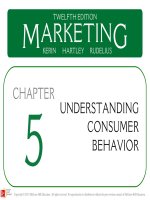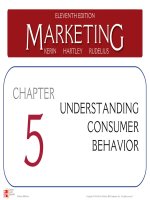Lecture Marketing (12/e): Chapter 7 – Kerin, Hartley, Rudelius
Bạn đang xem bản rút gọn của tài liệu. Xem và tải ngay bản đầy đủ của tài liệu tại đây (4.19 MB, 42 trang )
Copyright © 2015 McGrawHill Education. All rights reserved. No reproduction or distribution without the prior written consent of McGrawHill Education.
LEARNING OBJECTIVES (LO)
AFTER READING CHAPTER 7, YOU SHOULD BE ABLE TO:
LO 7-1
LO 7-2
Describe the nature and scope of world
trade from a global perspective and
identify the major trends that have
influenced world trade and global
marketing.
Identify the environmental forces that
shape global marketing efforts.
72
LEARNING OBJECTIVES (LO)
AFTER READING CHAPTER 7, YOU SHOULD BE ABLE TO:
LO 7-3
LO 7-4
Name and describe the alternative
approaches companies use to enter
global markets.
Explain the distinction between
standardization and customization
when companies craft worldwide
marketing programs.
73
BUILDING A BILLION DOLLAR BUSINESS
IN INDIA THE DELL INC. WAY
74
LO 7-1
DYNAMICS OF WORLD TRADE
WORLD TRADE FLOWS
Global Perspective
• Trade Feedback Effect
• Countertrade
United States Perspective
• Gross Domestic Product (GDP)
• Balance of Trade
75
FIGURE 7-1 Leading countries in global
merchandise trade in terms of imports (U.S.)
and exports (China)
76
LO 7-1
DYNAMICS OF WORLD TRADE
COMPETITIVE ADVANTAGE OF NATIONS
Porter’s “Diamond”
• Factor Conditions
• Demand Conditions
• Related and Supporting Industries
• Company Strategy, Structure, and Rivalry
Economic Espionage Act (1996)
77
FIGURE 7-2 Porter’s diamond of national
competitive advantage has four key elements
on why some industries and firms in different
countries become world leaders
78
Sony Bravia 3D HDTV and Bruno Magli Shoes
LO 7-1
What element of Porter’s Diamond of
National Competitive Strategy?
79
LO 7-1
MARKETING IN A BORDERLESS
ECONOMIC WORLD
TREND 1—DECLINE OF ECONOMIC PROTECTIONISM
Protectionism
Tariffs
Quota
General Agreement on
Tariffs and Trade (GATT)
World Trade Organization (WTO)
710
LO 7-1
MAKING RESPONSIBLE DECISIONS
GLOBAL ETHICS AND GLOBAL ECONOMICS—
THE CASE OF PROTECTIONISM
711
FIGURE 7-3 Protectionism hinders world trade
when countries raise prices and limit supply
through tariff and quota policies
712
LO 7-1
MARKETING IN A BORDERLESS
ECONOMIC WORLD
TREND 2—RISE OF ECONOMIC INTEGRATION
European Union
• Euro
North American Free Trade
Agreement (NAFTA)
Asian Free Trade Agreements
713
FIGURE 7-4 The European Union in late-2013
consists of 28 countries with more than 500
million consumers
714
LO 7-1
MARKETING IN A BORDERLESS
ECONOMIC WORLD
TREND 3A—GLOBAL COMPETITION
Global Competition
Strategic Alliances
715
FIGURE 7-A Global companies and marketing
strategy
716
LO 7-1
MARKETING IN A BORDERLESS
ECONOMIC WORLD
TREND 3B—GLOBAL COMPANIES
International Firms
Multinational Firms
• Multidomestic Marketing Strategy
Transnational Firms
• Global Marketing Strategy
• Global Brand
717
LO 7-1
MARKETING IN A BORDERLESS
ECONOMIC WORLD
TREND 3C—GLOBAL CONSUMERS
Global Consumers
718
LO 7-1
MARKETING MATTERS
The Global Teenager—A Market of
2 Billion Voracious Consumers
719
LO 7-1
MARKETING IN A BORDERLESS
ECONOMIC WORLD
TREND 4—A NETWORKED GLOBAL MARKETPLACE
720
LO 7-2
A GLOBAL ENVIRONMENTAL SCAN
CULTURAL DIVERSITY
Cross-Cultural Analysis
Values
Customs
• Foreign Corrupt
Practices Act (1977)
721
FIGURE 7-B Cultural appreciation
722
LO 7-2
A GLOBAL ENVIRONMENTAL SCAN
CULTURAL DIVERSITY
Cultural Symbols
• Semiotics
#13
723
LO 7-2
A GLOBAL ENVIRONMENTAL SCAN
CULTURAL DIVERSITY
Language
• Unintended Meanings
Nestlé
Ad
• Back Translation
Cultural Ethnocentricity
• Consumer Ethnocentrism
724
LO 7-2
A GLOBAL ENVIRONMENTAL SCAN
ECONOMIC CONSIDERATIONS
Stage of Economic
Development
• Developed Countries: Japan
• Developing Countries
Made the Move:
Remain Locked:
Brazil
Tanzania
• Bottom of the Pyramid
725









